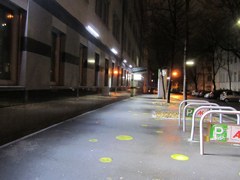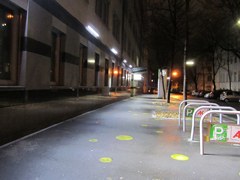Polycarbonate Lenses for Efficient LED Lighting
Vienna, June 2011 – The potential cost and energy savings alone make LED’s (light-emitting diodes) a smarter choice than other lighting technologies for interior and exterior lighting applications. Bayer MaterialScience recognized this trend early on and has supported it by developing special grades of its transparent polycarbonate Makrolon®. Lenses made from this material are characterized by particularly high light transmission and ensure that the light is concentrated and directed efficiently.
Furthermore, LED technology offers the possibility of adjusting the color of the light as needed. LED lighting can thus significantly improve contrast and color rendering, which in turn contributes to better vision in a dark environment.
The innovative facade lighting at Bayer’s branch office in Vienna, Austria, exploits these very characteristics. The metal halide lamps used previously were replaced with LED spotlights developed by Vienna-based LEDworx GmbH. The purpose of switching to LEDs is to improve the lighting situation in front of the building and create safer walkways with fewer accidents for the employees and other pedestrians. The feedback received since the installation of the lights has all been positive.
“The new LED luminaires display significant advantages in terms of brightness on the walkway combined with uniform illumination of the entire area, says Thomas Zeiler, Sales Director at LEDworx. “And most importantly, these advantages are achieved with a 25 percent lower connected load. In other words, saving energy and enhancing quality are not contradictory.”
In collaboration with Bayer, Carlco Optics is currently testing the new Makrolon® LED2643, and also used it to manufacture the lenses for this project. The material was developed specifically for lighting fixtures for solid-state lighting (SSL). It is characterized by particularly high transmission and very good resistance to the light emitted by LEDs. Bayer MaterialScience developed this product and others in the Makrolon® LED family specifically for lens applications in LED-based luminaires.
About Bayer MaterialScience:
With 2010 sales of EUR 10.2 billion, Bayer MaterialScience is among the world’s largest polymer companies. Business activities are focused on the manufacture of high-tech polymer materials and the development of innovative solutions for products used in many areas of daily life. The main segments served are the automotive, electrical and electronics, construction and the sports and leisure industries. At the end of 2010, Bayer MaterialScience had 30 production sites and employed approximately 14,700 people around the globe. Bayer MaterialScience is a Bayer Group company.



